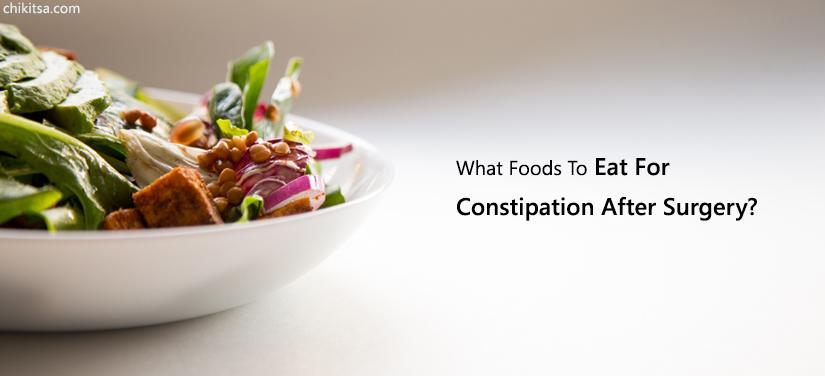What Foods To Eat For Constipation After Surgery

Surgeries, of any kind, are painful. Recovering from a surgery not only needs inner physical strength but a much stronger mental strength to help heal the internal changes and alterations done during the surgery. While, medications and therapies are provided in order to help recuperate from such physical changes, one side effect which accompanies almost any surgery is the problem of constipation which starts right after the surgery and can take weeks to get cured.
Though constipation is a natural and normal phenomenon which is bound to accompany any surgery. The effect of such a phenomenon can be reduced while helping the body to heal faster only if the patient undergoing surgery is aware of what foods to eat for constipation after surgery and follows it sincerely.
Constipation After Surgery
Though constipation, normally does not create a situation where people need to worry. However, it can make the healing process a bit more uncomfortable. Some of the symptoms of constipation post surgery include
- When the patient is having fewer than three bowel movements in a week
- When the patient is experiencing a sudden decrease in bowel movements as compared to the pre surgery period
- When the patient has to strain himself/herself during bowel movements
- When the patient is having a bloating or increased gas formation.
- When the patient is having abdominal or rectal pain during a bowel movement or otherwise
- When the patient is having hard stools
- When the patient is feeling incomplete emptying even after bowel movements
In case a patient suffers from severe constipation, where the patient has not experienced any bowel movement after surgery in the entire week. The patient is advised to take some laxatives or stool softeners which can help them get relief from such constipation. Constipation is merely a side effect which makes the patient uncomfortable even in cases where the patient undergoes a laparoscopic surgery. Some of the usual causes of constipation after any surgery includes
- Intake of narcotic pain relievers, such as opioids post the surgery
- Effect of general anesthesia used during surgery
- The occurrence of an inflammatory stimulus, such as trauma or infection
- The occurrence of an electrolyte, fluid, or glucose imbalance
- Prolonged inactivity prior and post surgery
- Unusual changes in diet, especially intake of a diet with insufficient fiber content
Though constipation naturally affects almost all of the patient's post surgeries. However, one should get worried and consult a practising medical practitioner immediately only if the patient notice any of the following
- Anal Fissures
- Hemorrhoids
- Fecal Impaction
- Rectal Prolapse
What Foods to Eat for Constipation After Surgery?
Constipation post surgery can be managed easily. The patients need to undertake small steps in order to manage the situation of constipation. Some of the general advice in such a scenario would be
- To do some exercise in order to initiate physical activity depending on the physical condition of the patient such as walking around as much as possible
- To stay more hydrated by drinking more fluids especially water and juice while avoiding tea and coffee (they are diuretics which can create further trouble in such a situation)
- Eating food rich in fiber such as prunes, psyllium husk, cabbage and other such fiber rich food which would help stimulate the bowel
- Eating smaller meals all through the day rather than three large meals, thus helping the digestive system of the body perform better.
Some of The Dietary Advices Which Can Relieve Constipation After Surgery Include
- Consuming High Fiber or fiber rich diet including:
- Whole Grains
- Prunes and Prune juices
- Fresh Fruits
- Vegetables
- Beans
- Consuming lots of water
- Consuming other fluids such as juices and buttermilk
Avoiding Constipating Foods
- Caffeinated beverages such as tea and coffee
- White bread
- Rice
- Bananas
- Processed foods
- Dairy products
While constipation is a normal phenomenon after any surgery, its management too is easy. The patient and the caregivers merely need to understand what foods to eat for constipation after surgery, and the other lifestyle changes such as engaging in physical activities and following the lifestyle in order to recuperate from the surgery soon.








